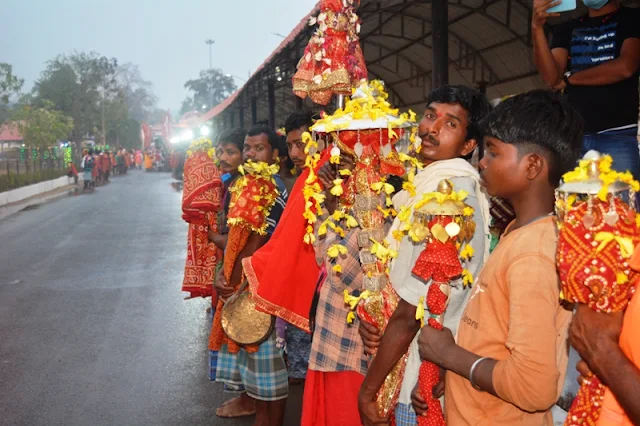 |
| Gaur dancers on the streets of Dantewada |
While the rest of India soaks in the spirit of Holi to welcome spring, Dantewada district in southern Chhattisgarh takes pride in its own carnival involving music, revelry and celebrations.
The 10-day long Phagun Madai festival of Dantewada, which is over 700 years old, coincides with the festival of colours observed across the country. Grand processions are a common sight on the district’s roads packed to the full with curious onlookers. Bison horn dancers from the Dandami Maria tribe of south Bastar perform on the streets of Dantewada during the festive season. The Phagun Madai witnesses the coming together of royalty, Adivasis and non-Adivasis of the entire Bastar region comprising seven districts, including Dantewada.
 |
| Devotees walk holding their gods and goddesses |
Suresh Karma, who heads the Sarva Adivasi Samaj in Dantewada, said that for the entire 10-day period, various types of customs and rituals are performed in the midst of dance and music. Decorated processions are taken out in the form of dolis or palkis (palanquins) during the evenings. There are 42 tribal groups in Chhattisgarh. So, there is a Sarva Adivasi Samaj to give them a proper platform.
 |
| Nagada, a main attraction of the festival |
Some of the rituals are interesting like the traditional drama or nukkad natak showing the hunting of the rabbit which takes place at night. According to Karma, it symbolises the great hunting tradition observed in the olden days. People still remember it and carry on the tradition with great fervour on the stage. A man essays the role of the rabbit. Once, there was dense forest all around and many animals were found. So, it is basically a remembrance.
 |
| Palkis are taken out decorated daily |
Nandlal Rathore, who is associated with the Banjara Samaj, said devotees perform rituals with great fervour. Phagun Madai is also linked to the observance of pandum, a Gondi word which means festival.

Comments